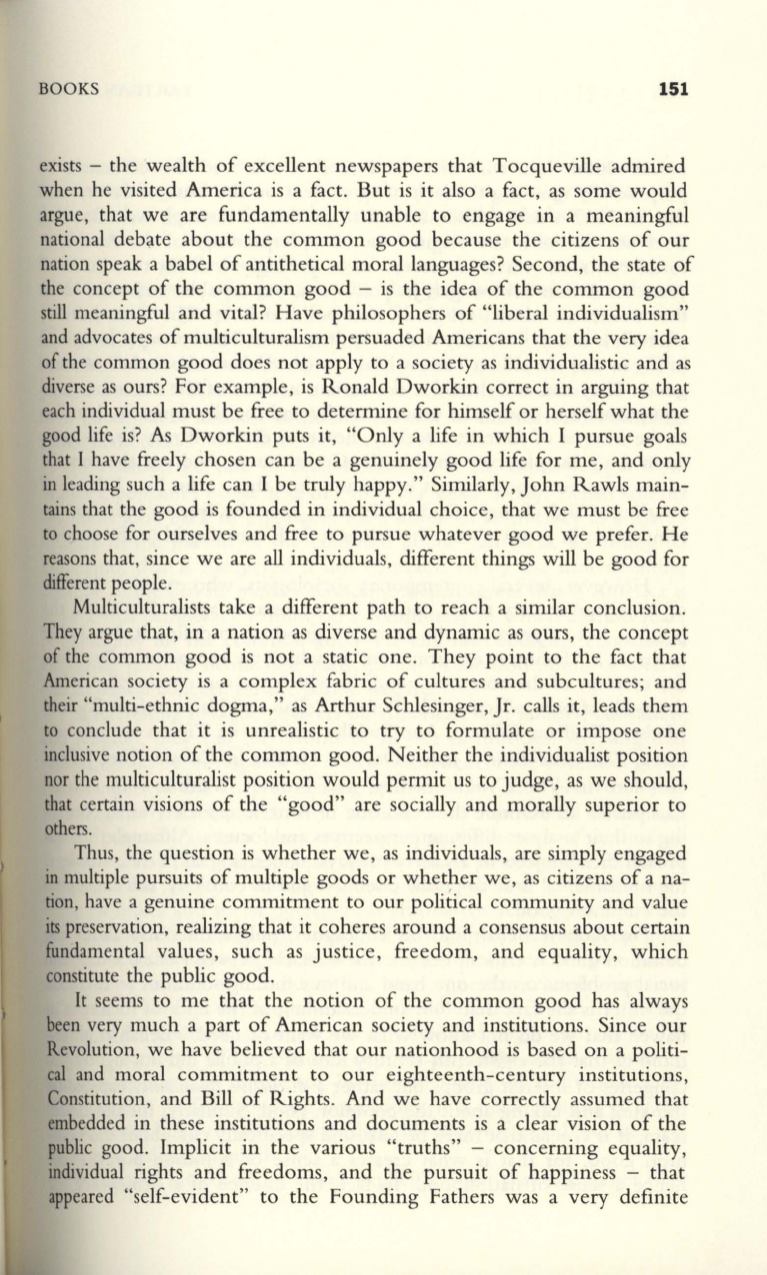
BOOKS
151
exists - the wealth of excellent newspapers that Tocqueville admired
when he visited America is a fact. But is it also a fact, as some would
argue, that we are fundamentally unable to engage in a meaningful
national debate about the common good because the citizens of our
nation speak a babel of antithetical moral languages? Second, the state of
the concept of the common good - is the idea of the common good
still meaningful and vital? Have philosophers of "liberal individualism"
and advocates of multiculturalism persuaded Americans that the very idea
of the common good does not apply to a society as individualistic and as
diverse as ours? For example, is Ronald Dworkin correct in arguing that
each individual must be free to determine for himself or herself what the
good life is? As Dworkin puts it, "Only a life in which I pursue goals
that I have freely chosen can be a genuinely good life for me, and only
in
leading such a life can I be truly happy." Similarly, John Rawls main–
tains that the good is founded in individual choice, that we must be free
to choose for ourselves and free to pursue whatever good we prefer. He
reasons that, since we are all individuals, different things will be good for
different people.
Multiculturalists take a different path to reach a similar conclusion.
They argue that, in a nation as diverse and dynamic as ours, the concept
of the common good is not a static one. They point to the fact that
American society is a complex fabric of cultures and subcultures; and
their "multi-ethnic dogma," as Arthur Schlesinger, Jr. calls it, leads them
to conclude that it is unrealistic
to
try to formulate or impose one
inclusive notion of the common good. Neither the individualist position
nor the multiculturalist position would permit us to judge, as we should,
that certain visions of the "good" are socially and morally superior to
others.
Thus, the question is whether we, as individuals, are simply engaged
in multiple pursuits of multiple goods or whether we, as citizens of a na–
tion, have a genuine commitment to our political community and value
its
preservation, realizing that it coheres around a consensus about certain
fundamental values, such as justice, freedom, and equality, which
constitute the public good.
It
seems to me that the notion of the common good has always
been very much a part of American society and institutions. Since our
Revolution, we have believed that our nationhood is based on a politi–
cal and moral commitment to our eighteenth-century institutions,
Constitution, and Bill of Rights. And we have correctly assumed that
embedded in these institutions and documents is a clear vision of the
public good. Implicit in the various "truths" - concerning equality,
individual rights and freedoms, and the pursuit of happiness - that
appeared "self-evident" to the Founding Fathers was a very definite


